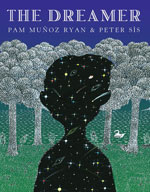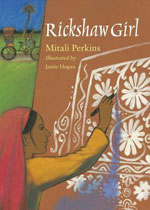 The Dreamer, written by Pam Muñoz Ryan and beautifully illustrated by Peter Sis, is the story of the childhood of poet Pablo Neruda. He was an absent-minded dreamer struggling with an authoritarian father.
The Dreamer, written by Pam Muñoz Ryan and beautifully illustrated by Peter Sis, is the story of the childhood of poet Pablo Neruda. He was an absent-minded dreamer struggling with an authoritarian father.
It’s full of wonder, but it really feels like a mere introduction. I wanted more. And I should confess I’m not into poetry. I preferred the details on Neruda’s life than the excerpts of his poetry.
The end of the author’s note includes a powerful detail about General Pinochet’s soldiers ransacking Neruda’s home just months before his death. Neruda simply told the soldiers:
“Look around—there’s only one thing of danger for you here: poetry.”
There’s an entire story to the power of words in Neruda’s life, but this book barely touches on it. But I love Pam Muñoz Ryan’s comment about writing at the Festival of Faith and Writing:
“I read because it’s safe. I write because it’s dangerous.”
The Authoritarian & the Dreamer
Shifting gears, what most struck me about this story was the scatterbrained boy and the frustrated father. I saw myself in that father, pushing his son to stop dawdling, to hurry up, to focus.
Hopefully I’m nowhere near as authoritarian and rigid as Neruda’s father, forcing his son into the ocean until he learned how to swim and burning his writings.
But the frustration, the lack of patience, the quick dismissal—they feel too familiar.
